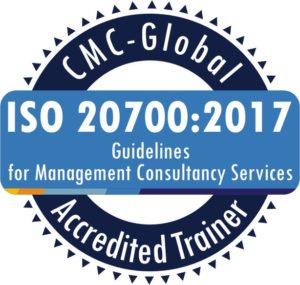Here is an article written by David Norman, Chair at The Consultants Peer Group (TCPG). 
Coaching consultants beyond start-up to success and on to significance.
David recently completed the ICMCI ISO 20700 checklist training program that I offer through an LMS, which inspired him to write this article. With his permission I am reproducing it here.
====
Did you know there is an international standard providing guidelines for delivery of management consulting services? A colleague, Dwight Mihalicz (CMC® Canada), writes the following about ISO 20700, “It is a new standard [which] aims to improve transparency and understanding between clients and management consultancy service providers to achieve better results from consultancy projects.”
In the U.S. alone, there are between 800,000 and 1.1 million people in some area of consulting – all vying for the same attention (and projects) although their specialties/skills, e.g., what they offer, vary across a wide spectrum. Separating yourself/your practice becomes a bit problematical without other ‘tools.’ The first tool is readily available to you in which to differentiate yourself is to join your national institute of management consultants (in the U.S., Institute of Management Consultants USA, one of 49 such constituent country members of the International Management Consulting Institutes (ICMCI). Most of these institutes offer networking and professional education to members. More experienced consultants can differentiate themselves further by seeking the Certified Management Consultant® (CMC®) designation, which essentially says to the world, “I am not between jobs, I am not a self- appointed expert, I am not the person with a great idea; I am a recognized professional.” The CMC® designation includes experience requirements, a body of knowledge/competencies, repeatable processes, and a code of conduct (including, in the U.S., adherence to an enforceable Code of Ethics).
A third tool (ISO 20700) is relatively new and in its early adoption phase by consultants worldwide who wish to further differentiate themselves and their practice from others. More importantly, it is the first ISO service delivery standard for professional services in the world and, therefore, “marks an essential milestone in further development” of the consulting industry. Further, it is a guideline, not a compliance standard and is flexible in its application.
ISO 20700 brings increased attention to the need for transparency. The checklists embedded in ISO 20700 provide a common framework within which to hold constructive, open conversations with prospects/clients about the intended/proposed service, better ensuring success and satisfaction by clients. Its use provides this common framework for prospects/clients to appraise consultants and evaluate their work, precludes misunderstandings about the nature of the assignment, and clearly identifies the value of the engagement.
There seem to be three parts to management consulting services (1) the skill you bring to your clients (e.g., your experiences), (2) the management consulting competencies you use, and (3) the processes you practice to provide clarity about the assignment. It is the combination of the three that ensures consulting success and client satisfaction:
Number 1, the skills and experiences you bring as a consultant to management (the ‘What’ you offer, whether Strategy, IT, Operations, H/R, profitability, DEI, etc.);
Number 2, the management consulting competencies are attested through the CMC® designation (property of ICMCI, issued by the national institute [IMCUSA in U.S.] and are about personal competence; and
Number 3, the processes, is concerned with managing a consulting project (and is the property of ISO).
The combination of all three is a major differentiator in a very crowed marketplace and further identifies you as a professional management consultant.
Note: As of this writing, IMC USA is developing a course to be offered through its Learning Management System (LMS) on earning your ISO 20700 award. Expect announcement soon.
======

If you are interested, check here to find out if your Institute offers the program.
If your country is not on the list, you can look here for information about a version of the course offered through CMC Global Institute that will suit you.
Learn what management consultants around the world are saying about this course here.






